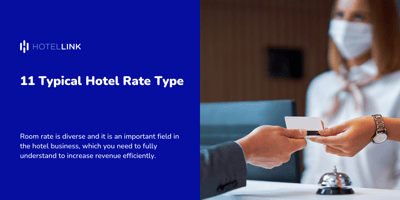Have you ever wondered what makes a vacation so perfect that guests leave with a smile, return...
Optimizing Hotel Revenue Management Strategies In The Peak Season
The peak travel season presents an ideal opportunity for hotels to boost revenue and profit. However, success doesn’t happen by chance - it requires a well-structured, flexible revenue management strategy and the effective use of appropriate support tools. So how can hotels maximize their revenue potential during peak periods while still ensuring a great guest experience? In this article, Hotel Link outlines the key factors and optimization strategies that every hotel can apply.
The Importance of Revenue Management in the Peak Season

Peak season is when room demand surges, creating favorable conditions for optimizing pricing and maximizing profits. However, high demand also means that without proper preparation, hotels can face issues like being overwhelmed, reduced service quality, or mispriced offerings.
An effective revenue management strategy helps you:
-
Apply flexible pricing and respond swiftly to market fluctuations.
-
Maximize occupancy without sacrificing profitability.
-
Allocate operational resources smartly to maintain service quality.
-
Improve forecasting ability and support long-term planning.
Data Analysis and Booking Trends
Analyzing Historical Data
Examining data from previous peak seasons is a critical first step. Making informed decisions on pricing and distribution strategies requires analyzing past booking data in combination with current trends. Key questions to consider include:
-
How far in advance do guests typically book?
-
Which sales channels perform best during the peak season?
-
How much do guests spend on add-on services?
To answer these questions, consider:
-
Guest spending patterns: Understand how much guests spend, not only on rooms but also on services like dining, spa, and room service.
-
Average length of stay: Identify the average stay duration during past peak seasons.
-
Popular booking channels: Determine whether guests book mainly through direct channels, OTAs, hotel websites, or travel agencies.
-
Customer segments: Understand the types of guests who have stayed during past peak seasons - business travelers, families, couples, or tour groups.
Market and Competitor Research
To implement an effective revenue strategy, you need to understand your current business environment:
-
Competitor analysis: Monitor room rates, promotional campaigns, and service packages offered by competitors in your area.
-
Market trends: Study the latest travel trends, shifts in customer booking behavior, and expectations of modern travelers.
-
Local events: Stay informed of upcoming festivals, conferences, or large events taking place in your region during peak season.
You can use tools like Smart Competitor to compare room rates and availability with competitors in real time. This information allows you to adjust your pricing strategy to remain competitive and profitable.
Accurate Demand Forecasting
Use historical data and market analysis to accurately forecast room demand during peak seasons:
-
Advanced forecasting models: Utilize data analytics and AI tools to predict daily, weekly, and monthly room demand.
-
Segment-based forecasting: Forecast demand for each room type and customer segment.
-
Flexible adjustments: Be ready to adjust your forecasts based on factors like weather changes, unexpected events, or market shifts.
Dynamic Pricing and Market Segmentation Strategies
Implementing Dynamic Pricing with Smart Rate
Keeping a fixed rate during peak season may cause missed revenue opportunities. Dynamic pricing is one of the most powerful tools for revenue optimization:
-
Real-time price adjustments: Change room prices based on market demand, occupancy levels, and booking lead time.
-
Day-of-week pricing: Apply higher rates on weekends or high-demand days.
-
Booking timing strategies: Offer early bird discounts or higher rates for last-minute bookings.
Hotel Link’s Smart Rate tool allows you to set up dynamic pricing based on remaining room inventory, booking window, and the performance of adjacent days. For example, if few rooms are left, the system will automatically increase rates based on your pre-set rules - helping you sell at the best price without manual intervention.
Effective Guest Segmentation
Not all guests have the same needs or spending power:
-
Segment by travel purpose: Create different packages and rates for leisure travelers, business guests, and families.
-
Segment by length of stay: Offer special incentives for long-stay guests.
-
Segment by loyalty level: Provide exclusive rates and perks for loyalty program members.
See also: Control Rate And Create Smart Pricing Strategies For Hotels With Hotel Link
Optimize Distribution Channels with Channel Manager
Not all distribution channels are equally effective. During peak season, optimizing OTAs, direct bookings, social media, and travel agencies is critical.
-
Quota allocation: Allocate room inventory to each channel based on performance and cost.
-
Channel-specific pricing: Use flexible pricing for different channels to ensure maximum profitability.
-
Promote direct bookings: Offer special incentives to encourage bookings via your hotel website and reduce OTA commissions.
Channel Manager synchronizes rates, availability, and bookings across all channels from a single platform. When a room is booked on Booking.com, for instance, the system automatically updates availability on Agoda, Traveloka, and other OTAs. This prevents overbooking, saves operational time, and reduces risk.
See also: Unlocking Revenue Streams: The Art of Effective Online OTA Management
Boost Revenue with Google Free Booking Links and Booking Engine
The rise in travel scams during peak season makes guests more cautious. Many prefer to book directly on hotel websites. This is a golden opportunity to increase direct revenue and reduce OTA dependency.
With Google Free Booking Links, your hotel can appear for free on Google search results when guests look for accommodations. Combined with Hotel Link’s Booking Engine, which includes integrated online payment, you can attract more guests while showcasing your brand’s reliability and professionalism.
Upselling and Cross-selling Strategies
Increase Average Order Value
Besides selling rooms, focus on increasing total guest spending:
-
Attractive packages: Bundle rooms with value-added services like breakfast, airport transfers, or local experiences.
-
Seasonal promotions: Design special offers for peak seasons, such as summer family getaways or romantic Valentine’s packages.
-
Cross-selling ancillary services: Promote additional services like spa, dining, and tours.
Room Upgrade Strategies

Upgrading rooms is a great way to increase revenue per guest:
-
Paid upgrades: Offer guests the option to upgrade to higher-category rooms for a reasonable fee.
-
Room upgrade auctions: Let guests bid for premium room upgrades.
-
Last-minute upgrades: Offer upgrades during check-in when premium rooms are still available.
Streamlined Cross-selling Process
Implement effective cross-selling throughout the guest journey:
-
Pre-arrival: Send pre-stay emails with service recommendations and special offers.
-
At check-in: Train front desk staff to suggest and upsell services during check-in.
-
During the stay: Use in-room notifications or hotel mobile apps to promote services and experiences.
Reduce Cancellations and No-Shows with Hotel Link Pay
No-shows during peak season can significantly affect hotel revenue. To minimize last-minute cancellations or guests failing to show, it's essential to request deposits or full payment before check-in.
With Hotel Link Pay, hotels can collect partial or full payments in advance depending on their policy. This tool integrates seamlessly into your operations, allowing flexible payment setups by room type or rate plan, while improving room-holding control.
Occupancy and Inventory Management
Booking Control Strategies
Maximizing room use is key to revenue management:
-
Minimum stay controls: Require minimum stays during peak days to avoid small gaps in the booking calendar.
-
Arrival/departure control: Manage check-in/check-out patterns to optimize room availability.
-
Flexible cancellation policies: Tighten cancellation rules during peak seasons for better planning and revenue protection.
Overbooking Strategy
Overbooking compensates for cancellations and no-shows:
-
Safe overbooking rates: Use historical data to determine a safe overbooking percentage.
-
Contingency plans: Prepare alternatives like relocating guests to partner hotels in case all guests show up.
-
VIP prioritization: Always guarantee rooms for VIPs and frequent guests, even in overbooked situations.
Room Mix Optimization
Tailor your room inventory to market demand:
-
Room type performance analysis: Review revenue and profitability by room type to find optimization opportunities.
-
Seasonal room adjustments: Reconfigure rooms to match peak season demand - for instance, converting single rooms into family suites.
-
Flexible space use: Turn public areas or meeting rooms into revenue-generating spaces during high-demand periods.
Invest in Guest Experience
.png?width=1200&height=800&name=optimizing-hotel-revenue-management-strategies-in-the-peak-season-2%20(2).png)
While peak season is lucrative, service quality must never be compromised. A positive guest experience encourages return visits and referrals, while a negative one could lead to damaging reviews.
Suggestions:
-
Train staff to handle high-occupancy situations effectively.
-
Use PMS to streamline task assignments and daily operations.
-
Send post-stay surveys to quickly address complaints.
Additionally, Hotel Link’s new OTA Reviews feature helps hotels consolidate, monitor, and respond to guest feedback across OTAs in one place - making reputation management more efficient.
See also: Easier Guest Review Management with the New Feature “OTA Reviews”
Strengthen Marketing Effectiveness
A well-planned marketing campaign can help you maximize last-minute bookings ahead of the peak season:
-
Send email marketing to past guests with exclusive offers.
-
Run remarketing ads targeting website visitors.
-
Launch attractive combo packages tied to local festivals or events.
Performance Evaluation and Continuous Optimization
An effective revenue management strategy requires constant monitoring and adjustments. Hotels should regularly track key performance indicators such as:
-
RevPAR (Revenue Per Available Room)
-
ADR (Average Daily Rate)
-
Occupancy rate by room type
-
Conversion rate from the hotel website
-
Cancellation and no-show rates
-
Performance of each distribution channel
These metrics accurately reflect the effectiveness of the current strategy and provide essential insights for timely adjustments in pricing, promotional campaigns, or room allocation across channels. In the dynamic context of the peak season, the ability to adapt quickly and flexibly is a significant competitive advantage for hotels.
Conclusion
Optimizing hotel revenue during the peak season is an ongoing journey that requires a seamless blend of market insight, smart pricing strategies, modern technology, a skilled team, and a strong brand presence. With a comprehensive and flexible approach, hotels can not only maximize revenue during peak periods but also lay a solid foundation for long-term sustainable growth.
If you're looking for solutions and professional support to optimize your hotel's revenue, Hotel Link is always ready to accompany you. Contact us for tailored consultation and strategies that best suit your business needs.



